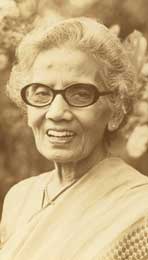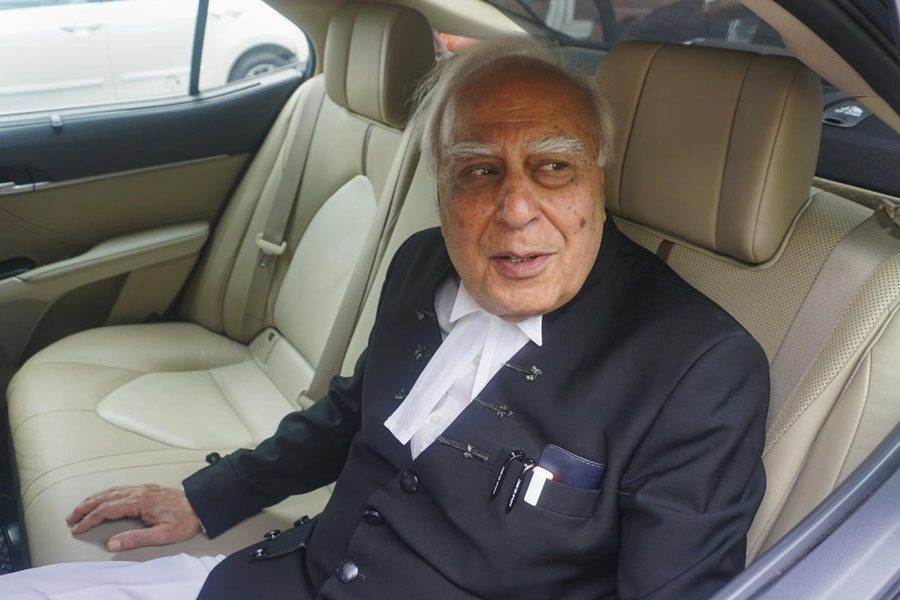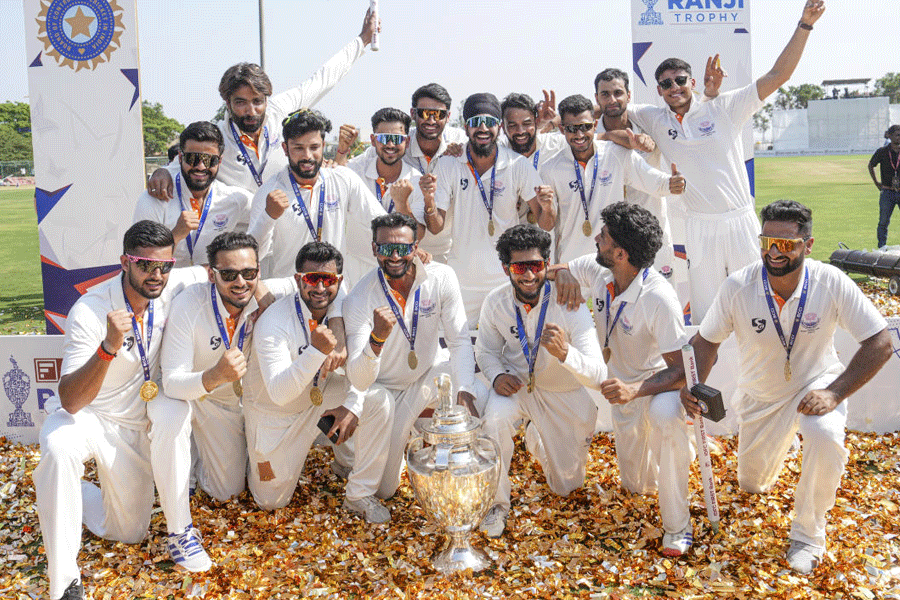|
|
| Selfless dedication |
Seeta Chaudhuri, who died seven months after celebrating her 90th birthday, ran a flourishing non-governmental organization long before NGOs had even been thought of. Today, they are big business. Indian NGOs evoke visions of handsome gifts under the Foreign Contributions (Regulation) Act and a giddy whirl of high-powered conferences and seminars in exotic holiday resorts from Las Vegas to Langkawi. Turn abroad and you immediately see powerful lobbying at the United Nations in New York by some 12,000 NGOs. Common to both is a lust for money and power or, to put it more charitably, for recognition.
When I returned to Calcutta in 1960, as a young journalist I desperately avoided three women. It wasn’t easy, for apart from being personally gracious and socially prominent, they were my mother’s childhood friends and ancient family connections. Romola Sinha was one, Renuka Ray another, Seeta Chaudhuri the third. Each was profoundly committed to a welfare organization (the All-Bengal Women’s Union, the Consumers Forum and Nari Seva Sangha respectively) whose activities she wanted me to cover.
It sounds unfashionable in today’s context, but they belonged to the tradition of Victorian grande dames and soup kitchens. Birth and wealth eased their way. A network of family connections linked them with everyone who mattered. Being Sir Brojendra Lal Mitter’s daughter and wife of the distinguished barrister and sometime Union finance minister, Sachindra Chaudhuri, underscored the parallel with Victorian philanthropy. Her mother, Protima Mitter, was one of the Sangha’s first two patrons, Sarojini Naidu the other. B.C. Roy and his sister-in-law, Brahma Kumari (Renu Chakravarti’s mother), were vice-presidents with Hemlata Mitter, whose daughter, Ela Reid, was on the committee. But unlike many other women also similarly blest, they shared their blessings with the less fortunate. They were steeped in a liberal tradition, personally familiar with all the savants of the age, touched by the Brahmo enlightenment even when they remained within Hinduism’s formal fold.
Like the daughters of many anglicized Bengali families, Mrs Chaudhuri went to St John’s Diocesan School and then, when Mrs P.K. Roy started the Gokhale Memorial Girls’ school, shifted there. But it was Kamala Girls’ School that was the R.C. Dutt family enterprise. Although only 24 when it was started in 1936, she became the school secretary. Later, she became president and held the position until the end.
Modern sociologists hold that serious social work must be endowed with salary, allowances, increments, perqui- sites and retirement benefits like the best jobs. It seems to me that the theory is more a reflection on contemporary personnel than the articulation of an abiding principle. I recall my aged grandmother taking a tram twice a week to the Maidan to serve tea to the troops. She also knitted mufflers for soldiers on the front. Any talk of payment would have been impertinent.
Snide comments were heard even then. “Committee memsahib” was one; “Lady Bountiful” another. Smart people sneered at “do-gooding.” Nevertheless, volunteers like Mrs Chaudhuri were infinitely preferable to many careerist social workers for two sound reasons. First, the sturdy institutions that they created extended substantial and undiscriminating help to those in need. Second, being the elite, they already had everything and sought nothing for themselves.
The Sangha was born out of the horrors of the Bengal famine “when the entire society was in a state of upheaval,” to quote Mrs Chaudhuri. Shyama Prasad Mookerjee presided over the inaugural meeting in 1944, and Mrs Chaudhuri and Khitish Prasad Chattopadhyay were the two honorary secretaries. Sushobhon Sarkar and Swami Punyananda demonstrated that the pioneers were not prisoners of any ideology. The founders fell by the wayside one by one, but Mrs Chaudhuri soldiered on. The Sangha was her life’s blood. She was its sustenance.
They called it Nari Seva Sangha because mothers, wives and daughters bore the brunt of the suffering. From a milk and khichri kitchen, the Sangha blossomed into a comprehensive centre for women who had no other hope. Its industrial school teaches tailoring so that girls can qualify for the Lady Brabourne diploma. There are classes in kantha embroidery, batik work, weaving, block-printing, book-binding, preserving food. Other facilities include a training canteen, printing press, nursery school for the under-privileged, and a working women’s hostel. Computer-training and an air-conditioned auditorium keep up with the times. About 70 girls live in, and another 80 are day students.
“Even Muslim girls came to Nari Seva Sangha for vocational training,” says Sukumari Chaudhuri (no relation), who was widowed in the 1946 Noakhali carnage and fled East Pakistan in 1950 to set up house in a jabardakhal colony. “But I never felt any hatred or animosity towards them. Our teachers, like Bina Dasgupta, were made of different stuff altogether. They taught us to be secular and tolerant.”
Hers is an epic tale of Bengali struggle and survival, made possible by the Sangha. It gave her vocational training and helped her to find a job with Bengal Lamp, which employed a number of refugee women whom the Sangha had trained. Sukumari Chaudhuri married again, this time a political activist, and was in the forefront of the 1955 agitation for bonus that the undivided Communist Party of India spearheaded. Visitors commented on the portrait of Lenin in the verandah of her modest Santoshpur dwelling while she listened to Ramkatha across the road.
The Sangha was not alone in the field. Nor did it operate on a grand scale. The annual revenue budget of around Rs 20 lakhs is not impressive compared to budgets of over a crore for high-flying NGOs with archives and databases that advertise on the internet for researchers, marketing managers, group leaders and other sophisticated functionaries.
Modernism certainly facilitates service. But many NGOs also feather private nests. Though Mrs Chaudhuri travelled abroad regularly with her husband, she was never in the jet-setting globe-trotting brigade of social workers who pontificate on Indian poverty at international gatherings. Her husband drove a Daimler, but his cars were private vehicles. They were not charged to charity.
The equipment that some NGOs receive from abroad often disappears mysteriously, to reappear in private homes or even the market. Such sharp practice was unheard of in Mrs Chaudhuri’s Sangha. It would have been equally unthinkable for her to lavish salaries and fees on friends and family masquerading as assistants or consultants. She would not have dreamt of charging the same ramshackle old computer to one foreign donor after another and pocketing the price each time. A real-life example can be cited for each abuse mentioned here. Some NGOs are power bases. Others are tax dodges. The greed of many of our socialites gives social work a bad name. They also make it easier for religious bigots to turn the screws on worthy organizations under the garb of ensuring that foreign contri- butions do not undermine national integrity.
Perhaps the Sangha plays only a limited role in alleviating Bengal’s distress. Marxist intellectuals might even denounce its work on the grounds that it blunts the edge of revolutionary anger. But people need whatever it can do and are grateful for its help. The Sangha supplements a negligent state.
Mrs Chaudhuri’s concern was also reflected in organizations like Refugee Handicrafts and the Women’s Polytechnic. But Nari Seva Sangha remained closest to her heart. I used to look forward to the Sangha’s spring fête, held during the first weekend in February, but not to having to sing — or, rather, write — for the sumptuous tea. I was not mature enough then to realize that it should have been a happy duty.
Looking back more than four decades later, I realize how modest were the expectations of women like Mrs Chaudhuri, Mrs Sinha and Mrs Ray, how diffident their appeals and how selfless their dedication. Seeta Chaudhuri asked for so little and gave so much. Her death marks the passing of an age.












